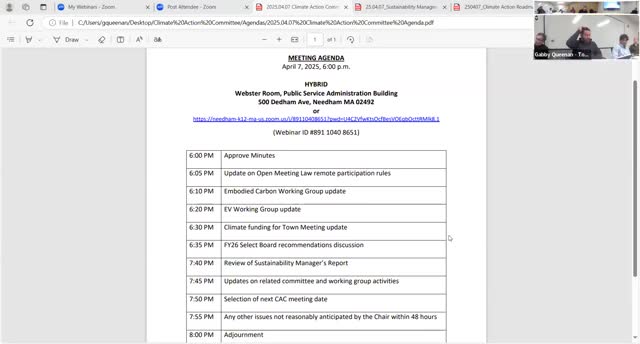Needham committee shares primer on embodied carbon, recommends further review
Get AI-powered insights, summaries, and transcripts
Subscribe
Summary
A Town of Needham working group produced an 11‑page primer explaining embodied carbon, its limits for municipal authority and possible local actions; the author disclosed using a paid “deep research” AI feature to draft the document and the committee agreed to review it ahead of a future discussion.
Steven, a member of the Town of Needham Climate Action Planning Committee, told the committee on April 7 that a small working group prepared a primer explaining embodied carbon and options for municipal action.
The committee was given an 11‑page document that, according to Steven, defines embodied carbon as “all of the materials, the processes, the transportation, the energy that goes into building a building” and distinguishes that from operational emissions. Steven said the paper sets out municipal tools — voluntary programs, outreach and education, zoning and master‑plan guidance, public procurement guidance, waste management policy, goal setting, and tracking/reporting — while noting legal and practical limits on local authority.
The report, Steven told the committee, also lists examples from other Massachusetts municipalities, including Boston, Cambridge, Newton, Brookline, Amherst and Somerville. He recommended the group read the primer as “homework” before returning to discuss potential Needham‑specific steps at a later meeting.
The primer’s provenance and drafting method attracted attention. Steven said he had sought legal guidance on whether the small working group could meet outside open‑meeting requirements but did not receive a firm response. He told colleagues he “used chat GBT” and the service’s paid “deep research” feature to prepare the paper, and said the product was “very well written, well researched.” The committee asked that when the document is shared, Steven also provide the prompts he used to generate the draft.
Committee members discussed what parts of municipal practice could be affected. Some members said Needham already conducts limited life‑cycle assessments (LCAs) for municipal projects, particularly for projects pursuing LEED certification; others said LCAs in town are often operational (energy, systems) rather than whole‑building material LCAs. The committee suggested the primer could be used to prompt small, non‑regulatory steps — for example, encouraging LCAs on municipal projects, incorporating material selection into project design conversations, and educating residents and boards about embodied carbon considerations when deciding between repurposing and new construction.
Members emphasized limits on municipal authority: building codes are state controlled and many production‑chain factors are outside local control. The primer, as described, also highlights ongoing state‑level working groups examining whether embodied carbon measures should be added to state codes.
The committee did not adopt any new policy at the meeting. Members agreed the primer should be circulated to the full committee for review and discussion at a future meeting; Steven said he would share the document and the prompts used to create it.
The committee also discussed using student projects (high‑school seniors) to run simple LCAs as a low‑cost way to build capacity and public awareness.
The committee asked staff to confirm which LCAs (whole‑building versus operational) the town already requires for municipal projects and to report back before the next discussion.
